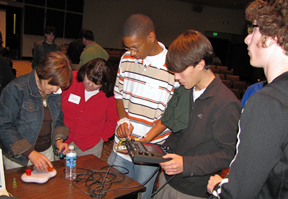When people think of a music career they typically think of being the one in the spotlight — the singer, the guitarist or the drummer.
 |
| High-school students and faculty experiment with various sound generators at the recent Music Technology Academy, hosted by the UAB Department of Music. |
“Many kids will be impressed and infatuated with some of the artists they see and they don’t have a clue what really goes on behind the scenes,” says Panion, professor of music and director of the Music Technology Academy. “Our goal is to show them what’s behind the scenes, because that is vital to the finished product. For every one artist that has a career in front of the microphone there are 10 or 15 more you don’t see.
“Not everybody can be a star, but a significant amount of money that is made does not always go to the person in front of the mic.”
High-school music students and K-12 music teachers got a glimpse of that action at a recent Music Technology Academy in the UAB technology lab and recording studio. The free, intensive, full-day workshop featured hands-on instructional sessions on production, engineering and recording. Informational workshops on computer-assisted instructional tools and computer music performances also were studied.
Panion and Co-Director Scott Phillips, Ph.D., also guided the 32 teachers and 24 students through a recording session, enabling them to use software for teaching, studying and performing music and giving them hands-on work scoring, recording and writing music.
Their objective is to give students and teachers useful knowledge and valuable skills for employing music technology in their classrooms and also make students aware of college and career opportunities in music technology.
“Technology has affected every field, music included,” Panion says. “We want to expose these students and teachers to the latest trends and developments, and we’re fortunate to have some wonderful facilities that enable us to do that.”
Leader in the field
The Department of Music is one of the few in the nation to offer students a degree in Music Technology, and it has been a leader in the field for 15 years.
Panion’s career as a Grammy-, Dove- and Stellar-award winning composer, conductor, producer and arranger gives him a grounded perspective of the music industry, and it enabled him to begin incorporating music technology and multimedia production in his classrooms in the mid-1990s. In fact, it was during one of his classroom lectures on orchestration when students began asking Panion about works of his they were hearing on the radio.
They simply wanted to know, “How’d you do that?”
“What I began to do in those classes was begin to incorporate a few things I was doing to show them how I was using my knowledge of music and technology with artists like Stevie Wonder,” Panion says. “It just grew from that to offering a few more courses to finally offering a full-fledged degree.”
The music-technology program has provided great opportunities for UAB students. Several have won fellowships to New York University and Northwestern University because of the musical foundation and technology background they received here.
“This degree makes them very competitive,” Panion says.
Growing academy
Panion held the first music academy for high-school students in 2005 and immediately saw the potential of the program.
He sent out invitations encouraging students to apply for the 15 available slots. Students had to show their music experience, their GPA, volunteer work and get a letter of recommendation. Panion received more than 70 applications.
“Most important, the caliber of students that were applying was tremendous,” Panion says. “They were all 3.85 or higher on their GPA. They all had opportunities to go to schools all over the country, and they wanted to come here to check out this program. I thought it would be a simple community-service project.”
Panion says the music academies go a long way toward selling the program to prospective students. The students and teachers attending this academy came from as far north as Nashville, as far east as Alpharetta, Ga., and as far south as Mobile.
“When you think about the field of music technology and what goes on behind the scenes — signal flow and electrical engineering, computer science, acoustics and the physics of sound, the business of marketing and selling music, especially via the Internet — you can get all of this and more in the music technology program at UAB,” he says. “The skills learned in our program are transferable to so many other fields.
And the academy is a great to draw people from so far away and show them what we have. Hopefully it will lead to some of those teachers sending their students here for their collegiate education.”